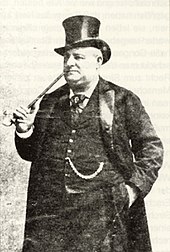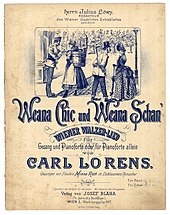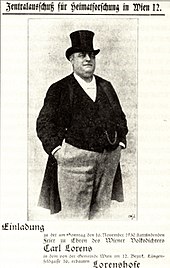Carl Lorens
Carl Lorens (born July 7, 1851 in Vienna - Erdberg ; † December 12, 1909 in Vienna) was an Austrian folk singer , folk poet and composer of Viennese songs .
Life
Carl Lorens was born as the son of Matthias Lorens and his wife Maria Cilek in what was then Kölblgasse 617 (today No. 7) in the 3rd district of Vienna, Landstrasse. After the elementary and middle school Lorens made an apprenticeship as a painter and house painter. But as early as 1870, Lorens, who had been an autodidact musician, appeared publicly as an impromptu singer in Matzleinsdorf and became a popular singer. In 1873 he married Leopoldine Wiesner and after a short time moved to Meidling in the 6th district , where he was to live for more than 30 years. It was here that he had most of his appearances in inns, initially in the folk singing companies of Amon, Drexler, Lautzky, Edi and Biedermann, but then mainly as a soloist. He became famous as an author and composer with his song D'Muatterliab (1875). He wrote for many well-known Viennese song singers, and numerous songs became widely known. Since he only received a one-off fee from the publishers for each of his songs, he was forced to keep writing new songs in order to receive income. Despite great success, Lorens never became wealthy throughout his life. In later years he campaigned for Viennese folk music and its interpreters, which around 1900 increasingly faced competition from new forms of popular music, also in journalistic form. In 1895 Lorens celebrated its 25th stage anniversary, on April 1, 1908, the 40th anniversary in the entertainment establishment Stalehner in Hernals . In 1909 he recorded eight songs for record. He died in Vienna's Sophienspital . Heinrich Hierhammer , Vice Mayor of the City of Vienna, attended his funeral on December 14, 1909, as well as numerous musicians and interpreters of his songs. Carl Lorens is buried in an honorary grave in the Meidlinger Friedhof (Department 3, Group 6, Grave No. 23). A verse from his last song is attached to it:
And if I should die, it should
be there,
Where on the mountains all around
Austrian wine grows.
As a farewell, I sing a song about
the German fatherland.
Then I sink into a cool grave
on the blue Danube beach.
Lorens lived in the Gaudenzdorf district of Meidling , where a plaque in his honor can still be found today in Schönbrunner Strasse 184. The Lorenshof , a community building in the Meidlinger Längenfeldgasse , was named in his honor.
His estate is in the Carl Lorens Archive in the Meidlinger District Museum, and the Vienna Library also has a small collection .
meaning
Carl Lorens was one of the most famous and productive Viennese song singers and composers of the late 19th and early 20th centuries. His special importance lies primarily in his work as a folk poet and composer. He wrote around 3,000 song texts and melodies, around 2,000 of which also appeared in print. In many cases they became folk songs and remained better known than the name of their author. During his lifetime he was also one of the most popular interpreters of the Wienerlied. He was the embodiment of a typical Viennese character, which he also propagated in his songs. His work mainly includes couplets, refrains, marching songs, duets, ganzeln and parodies. Next to Johann Sioly and Johann Schrammel , Lorens is the most important composer of the classical Wienerlied, and next to Wilhelm Wiesberg its most important folk poet.
Works
The most famous songs are among others
- A old unthread
- A waltz by Strauss
- Brother dissolute
- D'Banda is coming
- D'Frauenliab (music: Theodor F. Schild)
- D'Muatterliab
- There I am, there I stay, in Vienna I want to die (Music: Jean Schmid)
- You can ma wana like a clan child
- There must be d 'world in Wean net
- Then I close my eyes and say goodbye to the world
- Das Drah'n that's my life (music: Johann Strauss)
- The little cat
- 's Frauenkäferl
- The heart of an authentic Weana (music: Johann Schrammel)
- The mister papa
- God knows what he's doing
- The most beautiful man in Vienna
- The Waselbua
- The Water Gigerl (Music: Georg Schiemer)
- The Adelheid from the 4th floor
- The blunzen and the liver sausage
- The Liab is killing me
- The Sumsenbachers are not dying out
- Grandmother is sick of the net
- Hello everyone (music: Carl Zeller in the operetta The Bird Dealer )
- Today I never go ham
- I am net from Podiebrad (music: Theodor F. Schild)
- Yes, it's different where else, but that's just the way it is in Vienna
- Now let's have another bottle of wine
- People are all to me
- Wired me all night until d'Sonn laughs at us
- I'm going to Nussdorf today
- My old woman died
- My fellow countryman, weanerische / linzerische Buam
- Oh come on, you lovely Pauline
- Shiab i nör on anyway?
- It never gets more beautiful than it used to be
- This is how d'Leut speak in Vienna
-
As long as old Steffel is in Wean
- Also known under the title: Solang the old Peter
- Ui jeh there is a Bohm there
- Why? (That's love all alone)
- Was d'Liab is (Die Liab is a Vogerl)
- Weana Chic and Weana Schan '
- Because I am Harbe Poldi
literature
- ( Theophil) Antonicek : Lorens Carl. In: Austrian Biographical Lexicon 1815–1950 (ÖBL). Volume 5, Verlag der Österreichischen Akademie der Wissenschaften, Vienna 1972, p. 313.
- Josef Koller : The Viennese folk singing in old and new times. Retold and self-experience. With biographies, episodes, songs, numerous images and portraits based on contemporary images from the life of popular singers . Gerlach & Wiedling, Vienna 1931, p. 115 f.
- Felix Czeike : Historisches Lexikon Wien , Volume 4. Kremayr & Scheriau, Vienna 1995, ISBN 3-218-00546-9 , p. 90 f.
- Ernst Weber: D'people have little money. The folk poet and composer Carl Lorens (1851–1909) as a chronicler of the late 19th century. Sheets of the district museum Meidling, issue 49/50, ZDB -ID 512656-3 . Association for the preservation and promotion of the Meidlinger Heimatmuseum, Vienna 2000.
- Rudolf Flotzinger (Ed.): Oesterreichisches Musiklexikon. Volume 2: Gaal - Kluger . Publishing house of the Austrian Academy of Sciences, Vienna 2003, ISBN 3-7001-3044-9 , p. 1310 f.
- Elisabeth Th. Fritz (Hrsg.), Helmut Kretschmer (Hrsg.): Vienna Music History . Volume 1: Folk music and Viennese song . History of the City of Vienna, Volume 6, ZDB -ID 1126344-1 . Lit-Verlag, Münster / Vienna (among others) 2006, ISBN 3-8258-8659-X .
- Carolo, A .; Festschrift for the unveiling of the memorial plaque for the folk poet Carl Lorens at house 12, Schönbrunner Strasse 184. Vienna: Central Committee for Local History Research, 1928. 20 pp.
- Illustrated Wiener Extrablatt, evening edition, July 7, 1885
Web links
- Works by and about Carl Lorens in the catalog of the German National Library
- Carl Lorens Archive in the Meidling District Museum
- Entry on Carl Lorens in the Austria Forum (in the AEIOU Austria Lexicon )
- Sheet music and audio files by Carl Lorens in the International Music Score Library Project
Individual evidence
- ^ Wiener Journal, December 3, 1895 and Arbeiter-Zeitung, December 8, 1895
- ↑ Jörgerstrasse 26. Last entry in Lehmann's general housing indicator 1914, p. 1301, bottom center, online . - See also: Felix Salten : Stalehner . In: -: The Austrian face. Essays . Second edition. Fischer, Berlin 1910, pp. 59–70, full text online .
- ↑ Little Chronicle. (...) deaths. In: Neue Freie Presse , Morgenblatt, No. 16278/1909, December 15, 1909, p. 8, bottom left. (Online at ANNO ). .
- ↑ Hedwig Abraham: Karl Lorens . In: viennatouristguide.at , accessed on March 8, 2013.
| personal data | |
|---|---|
| SURNAME | Lorens, Carl |
| BRIEF DESCRIPTION | Austrian folk singer, folk poet and composer of Viennese songs |
| DATE OF BIRTH | July 7, 1851 |
| PLACE OF BIRTH | Erdberg (Vienna) |
| DATE OF DEATH | December 12, 1909 |
| Place of death | Vienna |





